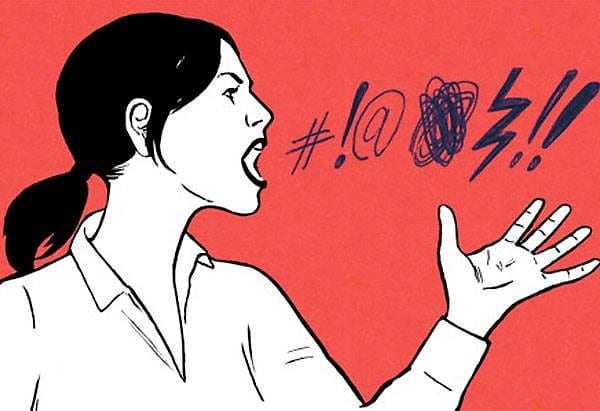
Why Do People Curse So Much? Exploring the Psychology
Updated Apri 30, 2024
The increasing prevalence of profanity in modern society, including its use by public figures, prompts a deeper examination of the psychological and social dynamics at play. A notable increase in the use of vulgar language by politicians on social media platforms was documented in 2019, highlighting a shift towards more open expressions of such language.
This trend is not merely about language evolution but also touches on broader psychological implications. Research indicates a surprising correlation between profanity and honesty. Contrary to the assumption that profanity signifies dishonesty, studies suggest that those who frequently use profane language may be more honest. They are often perceived as more authentic, as they are less likely to filter their expressions to conform to social norms.
The implications of these findings are significant, suggesting that profanity, far from being merely offensive or vulgar, may serve deeper social and psychological functions. It challenges traditional perceptions of language and morality, inviting us to reconsider the role of profanity in authentic communication and its broader societal acceptance.
Reevaluating the Link Between Cursing and Honesty
Recent studies have sparked a renewed interest in the complex relationship between profanity and honesty, challenging conventional views on the social implications of swearing. The research, encompassing multiple studies and a broad dataset, suggests cursing may be a marker of honesty rather than deceit.
The debate around profanity is rooted in its dual nature as both a form of norm-violating behaviour and a means of expressing genuine emotions. This dichotomy presents profanity as potentially indicative of social deviance and personal integrity. Researchers have sought to dissect this relationship by examining individual and societal behaviours in a series of methodologically diverse studies.
The initial study involved 276 participants who were assessed for their use of profanity and tendency to lie in a controlled laboratory setting. This was followed by a linguistic analysis of 73,789 Facebook users to observe real-life social interactions and a comparative study of profanity use and integrity indices across all 50 U.S. states. Across these varied contexts, a consistent pattern emerged: higher rates of profanity were associated with lower levels of lying and deception at the individual level and with higher integrity at the societal level.
Insights from Gilad Feldman and the Nature of Profanity
Gilad Feldman, a key researcher in this field, articulates that while profanity is often seen as inappropriate, it can also serve as a candid expression of one’s true feelings. This perspective aligns with historical observations by figures like Jonathan Swift, who famously critiqued societal norms and hypocrisy through his satirical works. Swift might have seen profanity as a form of honesty in a world veiled by pretence, suggesting that those who swear may be less inclined to filter their true thoughts and feelings, thus providing a more unguarded and authentic view of their character.
The Broader Implications and Ongoing Debates
While these findings offer compelling insights, they also contribute to an ongoing debate about the implications of profanity in social and professional contexts. It is important to consider that these studies are correlational and do not establish causation. Furthermore, the perception of profanity varies widely across different cultures and settings, influencing its social acceptability and interpreted sincerity.
The research on profanity and honesty challenges the traditional view that links swearing with moral turpitude and highlights the nuanced ways language and behaviour can reflect more profound truths about societal and individual values. As we continue to explore the multifaceted nature of human communication, it becomes clear that the words we choose, even those considered taboo, can offer significant insights into our collective and individual psyches.
A recent study by researchers from the University of Cambridge, Maastricht University, Hong Kong University, and Stanford suggests a positive relationship between profanity and honesty. The study found that individuals who use more profanity are less likely to lie and deceive others. The authors arrived at this conclusion by studying 276 individuals in a lab, examining the social interactions of 73,789 people on Facebook, and measuring the average profanity scores against the integrity index for each US state.
“Someone who does not filter their language, so swears, is more likely to be saying what they think to be true so are being more honest and genuine from their perspective. Independent
A second Study confirms that cursing Is A Sign Of Honesty.
“There are two conflicting perspectives regarding the relationship between profanity and dishonesty. These two forms of norm-violating behaviour share common causes and are often considered to be positively related. On the other hand, however, profanity is often used to express one’s genuine feelings and could, therefore, be negatively related to dishonesty. In three studies, we explored the relationship between profanity and honesty.
We examined profanity and honesty first with profanity behaviour and lying on a scale in the lab (Study 1; N = 276), then with a linguistic analysis of real-life social interactions on Facebook (Study 2; N = 73,789), and finally with profanity and integrity indexes for the aggregate level of U.S. states (Study 3; N = 50 states). We found a consistent positive relationship between profanity and honesty; profanity was associated with less lying and deception at the individual level and with higher integrity at the society level.”
Cursing and Honesty: An Unexpected Connection
Recent research has revealed an intriguing link between profanity and honesty. In a series of studies published in the journal Social Psychological and Personality Science, an international team of researchers from the Netherlands, UK, USA, and Hong Kong found that frequently cursing individuals are less likely to be associated with lying and deception.
The first study involved 276 participants who were asked to list their commonly used profane words and rate their reasons for using them. Surprisingly, those with a more extensive profane vocabulary exhibited a lower tendency to engage in dishonest behaviour, as measured by a lie test. This counterintuitive finding challenged the traditional notion that profanity signifies moral turpitude.
To further validate their findings, the researchers analyzed the social media interactions of 73,789 people on Facebook and each U.S. state’s average profanity scores and integrity indices. The results consistently showed a positive relationship between profanity usage and honesty at individual and societal levels.
Profanity and Authenticity
According to the lead author, Gilad Feldman from Maastricht University, “The relationship between profanity and dishonesty is tricky. Swearing is often inappropriate, but it can also be evidence that someone is telling you their honest opinion. Just as they aren’t filtering their language to be more palatable, they’re also not filtering their views.” This suggests that individuals who use profanity may be more authentic and less likely to engage in deception.
Potential Benefits of Swearing
While the link between cursing and honesty is intriguing, it’s important to note that correlation does not necessarily imply causation. However, other studies have suggested potential benefits associated with swearing, such as pain relief and emotional expression. Grace Tworek, a health psychologist, notes that while the literature on the benefits of cursing is mainly theoretical, some ideas have been tested, and correlations have been found between cursing and traits like creativity and emotional intelligence.
Embracing Authenticity
While profanity should still be exercised with caution and consideration for social norms, these findings challenge the traditional view that swearing is a sign of moral weakness. Instead, they suggest that individuals who use profanity may be more authentic and honest in their communication, valuing candour over social conformity.
As researchers continue to explore the psychology of swearing, it is essential to approach the topic with an open mind and a willingness to challenge long-held assumptions. By embracing authenticity and understanding the nuances of human behaviour, we can gain valuable insights into the complexities of language, honesty, and interpersonal dynamics.
Conclusion: Why Do People Curse So Much?
This essay argues that the common belief that swearing and cursing are unprofessional and unacceptable is unfounded. Research has shown that people who swear are often perceived as more honest, trustworthy, and likeable than those who do not. Studies have found that using profanity can indicate sincerity and authenticity, as people use swear words when emotionally charged or passionate about something. Swearing can also create a sense of camaraderie and help build connections between people, especially in informal or social situations.
Furthermore, the taboo around swearing and cursing may be cultural and not universal. Certain profanities are not considered offensive in some cultures, and their use is widely accepted.
However, it is essential to note that context matters. Swearing in certain situations, such as in formal or professional settings, may still be inappropriate and have negative consequences. Additionally, excessive profanity can be perceived as vulgar and offensive, so it is essential to use it judiciously.
The evidence suggests that swearing and cursing can positively affect social interactions and should not be stigmatized as inherently harmful. Instead, individuals should be mindful of the context and frequency of their use of profanity.
Some of the studies that support this argument include research from the University of Cambridge and a study published in the Journal of Social Psycholog.
Sources:
Stephens, R., Atkins, J., & Kingston, A. (2009). Swearing as a response to pain: A cross-cultural comparison of British and Japanese participants. The Journal of Pain, 10(7), 735-741.
Jay, T. (2009). The utility and ubiquity of taboo words. Perspectives on Psychological Science, 4(2), 153-161.
Feldman, R. S. (2013). The psychology of swearing: A comprehensive analysis of the joys and pitfalls of swearing in everyday life. CreateSpace Independent Publishing Platform.
Feldman, R. S., & Hester, R. L. (2012). The role of profanity in social relationships. Journal of Language and Social Psychology, 31(3), 253-275.
Stephens, R., & Umland, C. (2011). Swearing as a response to pain: A review of the evidence. Psychonomic Bulletin & Review, 18(6), 991-997.
Other Stories Of Interest
Is Disinflation Hitting Wall Street? Could be bad news for the fat cats
Experts Predicting Current Dow Jones Market To Crash
Meet the dollar vigilantes
How To Be Happy: Epicurus Had The Answer 1700 Years Ago

The Factors That Make Corporate Fraud More Likely
Microsoft Growing Cloud Business
Low Commodity Prices & Strong Dollar Destroying Sovereign Credit Ratings
Financial services industry desperately trying to Attract Millennials
Is The Bull Market Over? Mass Sentiment States It’s Not
Commodities Increased in April
Fossil Fuel Divestment Trends gain momentum
Plunging battery prices set to fuel surge in demand for EV’s
Media Manipulation; The Fraudulent Economic Recovery
Hidden Agenda Review; All three wars were predicted decades ago
Identify Market Opportunities: Negativity Equates to Opportunity
Real Doppelgangers: The Risks in the Age of AI


